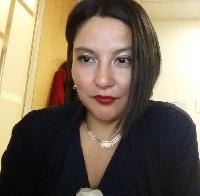*UNIVER-CITIES: TRANSLATION, LANGUAGES AND INTERNATIONALIZATION* Thread poster: Yolanda Bello Olvera
|
|---|
*CALL FOR PAPERS*
UNIVERSITY OF ALICANTE
6-8 NOVEMBER 2008
The current trend for most universities is to (re)discover the language
phenomenon, as part of the new experience of intercultural worlds that we
are facing. Although intercultural interaction is not confined to
universities (but has been part of our everyday life for centuries), these
are having to redefine their position, not only in terms of enrolments, but
also in t... See more *CALL FOR PAPERS*
UNIVERSITY OF ALICANTE
6-8 NOVEMBER 2008
The current trend for most universities is to (re)discover the language
phenomenon, as part of the new experience of intercultural worlds that we
are facing. Although intercultural interaction is not confined to
universities (but has been part of our everyday life for centuries), these
are having to redefine their position, not only in terms of enrolments, but
also in terms of programmes, goals, staff members, target groups, etc, and
the Bologna (and Sorbonne and Lisbon) declarations have given official shape
to this redefinition. On the other hand, universities still depend to a
large extent on national governments and policies, while maintaining their
own local and regional traditions.
Given the ultimate purpose of universities (*universe-cities*),
"globalization" is a key concept and the language issue is a strategic one,
be it on campus, in classes, within everyday society, or as a challenge for
international success and efficiency. But there are strong indications
concerning the insufficiency of our language (and translation) programmes
within this new (globalizing) environment.
Translation Studies might be symptomatic of this situation: translations
were envisaged on a rather local basis, as operations taking place between
two languages, but it has now become obvious that the binary view on
language(s) is outdated. The use of worldwide and permanent communication is
no longer exceptional, but forms part of the unavoidable and basic
functioning of almost all universities. By changing their approach to
language(s), they change their own composition and even identities and
goals.
Many members of academia make use of traditional political views on
languages; the question is whether academic societies will really function
as "universe-cities" when sticking to the traditional language policy
(approach) that is used within the nation-state model. Interdisciplinary
research worldwide indicates that our future approach to societies will need
to avoid defining "globalizing" tendencies in terms of - just - stereotyping
or standardizing. Diversity may need to support our attitudes toward
communication (with the whole world, not just with the pre-selected
so-called elites).
The aim of this symposium is to find out and discuss the exact
implication(s) of the various communicative changes entailed by the
internationalization (globalization) of language (and translation)
strategies.
In order to go beyond the translation/languages field and open our
perspective to other disciplines, we welcome paper presentations discussing
research in relation to any of the following areas:
- Languages, multilingualism and society
- Translation/Interpreting studies in the global era
- Translation and social psychology
- Organization theory and univer-cities
- Translation and political studies
- The international book market
- The (print/audiovisual) media world
Papers involve a 20-minute presentation in English, Spanish or French,
followed by a 10-minute discussion.
A selection of papers and reports will be published: the possibility of
combining volumes in different languages (English/Spanish) will depend on
the actual proposals. Texts for publication (first draft, open to revision)
should be handed in to the organizing committee during the symposium.
Please send maximum 300-word abstracts (in English, Spanish or French)
including keywords, together with a 100-word biodata paragraph by
15thAugust 2008 to the organizing committee (
[email protected]).
Successful proposals will be notified of their acceptance by 15th September
2008.
The following plenary speakers have confirmed their participation in the
Symposium:
JOSE LAMBERT (Catholic University of Leuven)
THOMAS HARRINGTON (Trinity College in Hartford – Connecticut)
ANTHONY PYM (University Rovira i Virgili)
REINE MEYLAERTS (University of Leuven)
ANDRÉS PEDREÑO (University of Alicante)
PEDRO AULLÓN (University of Alicante)
DOROTHY KELLY (University of Granada)
JEROEN VANDAELE (University of Oslo)
ANNA RODERICK (Multilingual Matters)
*For more information, please visit
http://www.ua.es/personal/iliescu/univercities/index.html* ▲ Collapse
| | | | To report site rules violations or get help, contact a site moderator: You can also contact site staff by submitting a support request » *UNIVER-CITIES: TRANSLATION, LANGUAGES AND INTERNATIONALIZATION* | Trados Studio 2022 Freelance | The leading translation software used by over 270,000 translators.
Designed with your feedback in mind, Trados Studio 2022 delivers an unrivalled, powerful desktop
and cloud solution, empowering you to work in the most efficient and cost-effective way.
More info » |
| | Protemos translation business management system | Create your account in minutes, and start working! 3-month trial for agencies, and free for freelancers!
The system lets you keep client/vendor database, with contacts and rates, manage projects and assign jobs to vendors, issue invoices, track payments, store and manage project files, generate business reports on turnover profit per client/manager etc.
More info » |
|
| | | | X Sign in to your ProZ.com account... | | | | | |




